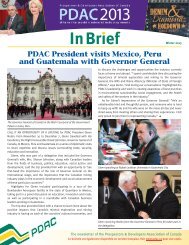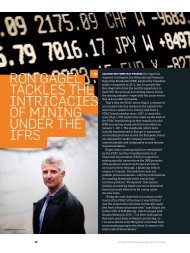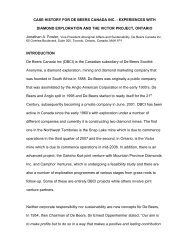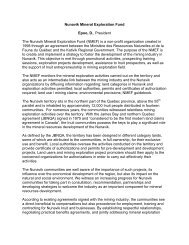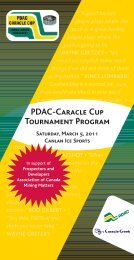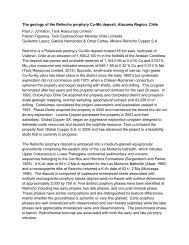Lands & Regulation - Nunavut Planning - Industry Letter
Lands & Regulation - Nunavut Planning - Industry Letter
Lands & Regulation - Nunavut Planning - Industry Letter
Create successful ePaper yourself
Turn your PDF publications into a flip-book with our unique Google optimized e-Paper software.
We are not aware of any other jurisdiction where statutory provisions authorize land use plans to<br />
establish quasi-criminal offences. Moreover, the relevant provisions of the <strong>Nunavut</strong> Land Claims<br />
Agreement, including those contained in Article 11, do not contemplate measures of this kind.<br />
In our view, other laws of general application that prevail in <strong>Nunavut</strong> already provide sufficient<br />
deterrents, by way of significant fines and other penalties, to deter environmental misconduct or<br />
non-compliance. We respectfully submit that the need for Bill C-25 to add an unorthodox<br />
enforcement mechanism to the existing regulatory regimes has not been justified. We therefore<br />
recommend that subsection 48(4) of Bill C-25 be deleted, along with the corresponding reference<br />
to that provision in section 74.<br />
(c)<br />
Proposed Requirements for Minor Variances<br />
As envisaged by section 11.5.10 of the <strong>Nunavut</strong> Land Claims Agreement, Bill C-25 provides for<br />
the granting of minor variances, where appropriate, from the requirements of land use plans.<br />
However, section 81 of the proposed enactment would establish an exhaustive regime governing<br />
such variances. The resulting process would include a public announcement, the right of any<br />
person to file a submission opposing the variance, an obligation on the <strong>Nunavut</strong> <strong>Planning</strong><br />
Commission to consider such submissions, and, where warranted, a public review of the minor<br />
variance application.<br />
Moreover, once invoked, this process would exempt the commission from complying with the 45-<br />
day time limit for determining whether the development proposal conforms to the applicable land<br />
use plan.<br />
The complex consultation process contemplated by the draft legislation for minor variances,<br />
particularly the potential requirement for a public review, seems burdensome and excessive. This<br />
is particularly the case when one considers that the proposed regime is meant to apply exclusively<br />
to minor variances. An elaborate scheme of this nature may well be unnecessary if, as<br />
contemplated by subsection 48(3) of the draft bill, the applicable land use plan clearly spells out<br />
the conditions that must be satisfied before a minor variance can be granted.<br />
We therefore suggest that the Commission, in and of its own accord, should discharge the<br />
responsibility of determining whether or not a minor variance will be granted or denied. An<br />
appropriate level of public awareness of such variances could still be ensured by filing written<br />
reasons prepared pursuant to paragraph 150(b) in the commission’s public registry.<br />
Consequently, we recommend that section 81 of Bill C-25 should be amended by deleting<br />
subsections (3), (4) and (5).<br />
(d)<br />
Timelines and Timeframes<br />
We acknowledge that, by incorporating a significant number of timelines and timeframes as part<br />
of the overall environmental and socio-economic impact assessment process, Bill C-25 is<br />
intended to establish an assessment and review regime that has the potential to be more rigorous<br />
and timely than the process envisaged by earlier versions of the draft legislation.<br />
However, a number of the proposed timeframes and timelines continue to be of concern to the<br />
mineral exploration sector.<br />
First, there are those that could potentially extend for as much as 180 days or six months, and<br />
therefore seem unnecessarily long. Examples include the following:<br />
Page 3 of 9


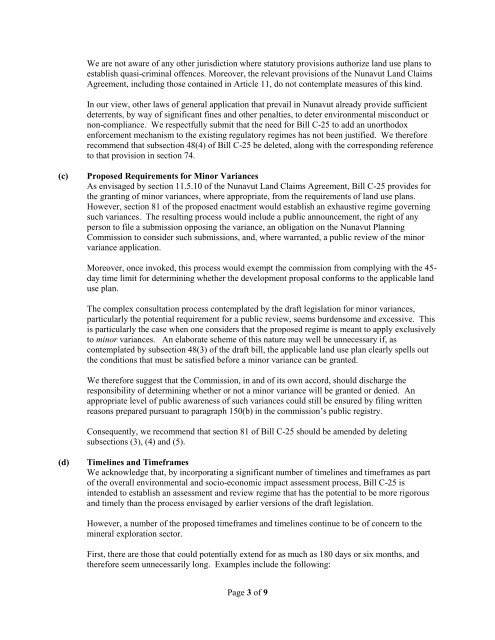


![Fredy Marino.ppt [Read-Only]](https://img.yumpu.com/46988510/1/190x146/fredy-marinoppt-read-only.jpg?quality=85)
